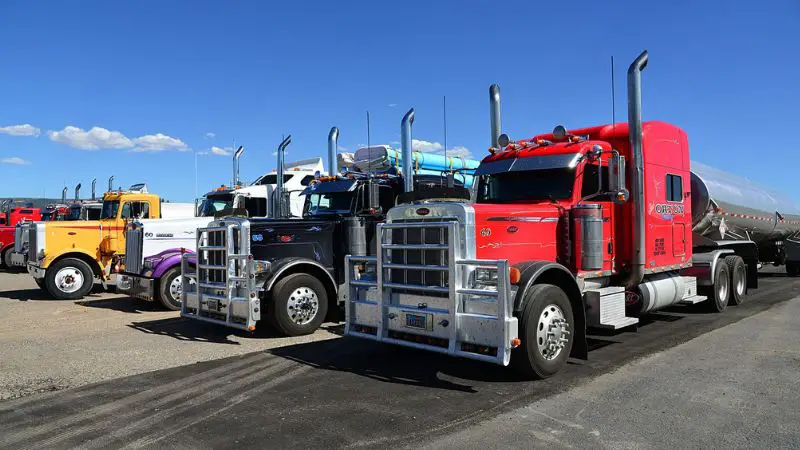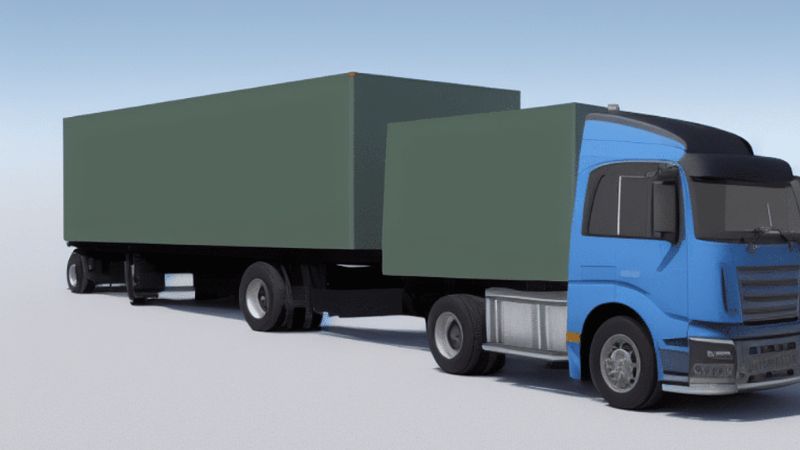If you’ve ever found yourself gazing at a massive truck cruising down the highway, towing what seems like an endless line of cargo, you might have wondered: What exactly is the difference between the truck and the trailer it’s pulling? It’s a question that piques the curiosity of many, and for good reason. Understanding the distinctions between these two critical components of the transportation industry is not only fascinating but also essential for those involved in logistics, trucking, or even just the curious onlooker.
In this comprehensive guide, we’ll dive deep into the world of trucks and trailers, unraveling the intricacies that make them unique, and shedding light on the symbiotic relationship that keeps the wheels of commerce turning.

What is a Truck?
A truck is a versatile and powerful motorized vehicle designed for the transportation of goods, materials, or people. These vehicles come in various shapes and sizes, from compact pickups to massive, heavy-duty rigs. Trucks typically have a distinct chassis and cabin layout, with an enclosed driver’s compartment at the front and a cargo bed or trailer-hauling space at the rear.
Trucks are known for their robust engines and sturdy construction, making them capable of handling a wide range of tasks, from hauling heavy loads to navigating challenging terrains. They play a vital role in industries like logistics, construction, and transportation, contributing significantly to the global economy.
What is a Trailer?
A trailer is a specialized non-motorized vehicle designed to be towed by a motorized vehicle, such as a car or a truck. Trailers are used for transporting a wide array of goods and materials, making them indispensable in industries like logistics and personal transportation. For instance, car trailers are specifically designed to transport automobiles, ensuring their safe and efficient delivery from one place to another.
These trailers come in various types, including enclosed and open versions, each tailored to specific needs. By hitching a trailer to a motorized vehicle, individuals and businesses can expand their cargo capacity, making them valuable assets for a wide range of applications.
What Is The Difference Between Truck And Trailer
The fundamental difference between a truck and a trailer lies in their mobility and functionality within the transportation system. A truck is a motorized vehicle that can operate independently. It has its own engine, wheels, and driver’s cabin, allowing it to move under its own power. Trucks are versatile and come in various sizes and types, from pickups used for personal transportation to heavy-duty rigs employed for hauling large cargo over long distances.
On the other hand, a trailer is a non-motorized vehicle designed to be towed by a truck or a car. It has wheels and a cargo-carrying structure but lacks an engine or a driver’s cabin. Trailers are entirely dependent on a motorized vehicle to be moved. They serve as extensions to trucks, enhancing their cargo-carrying capacity. Trailers come in different forms, including flatbeds, enclosed trailers, and specialized trailers like car carriers, each designed for specific transportation needs.
In essence, a truck is a self-propelled vehicle capable of moving independently, while a trailer is a supplementary unit towed by a truck, enhancing its ability to transport goods efficiently. Together, they form a crucial part of the transportation industry, facilitating the movement of goods and materials on a large scale.
Which is Better: Truck or Trailer?
The choice between a truck and a trailer isn’t a matter of one being universally better than the other; it hinges on individual needs and circumstances. Trucks offer self-reliance, mobility, and versatility, making them ideal for diverse applications. They’re self-propelled and can handle various terrains, providing a degree of independence.
On the other hand, trailers are efficient for expanding cargo capacity, especially when towing by a suitable vehicle. They’re specialized for particular uses and can be more cost-effective. The key is to assess your specific requirements, budget, and long-term goals to determine whether a truck or a trailer better serves your transportation needs.
Tips to Consider When Choosing Between a Truck and a Trailer
Choosing between a truck and a trailer is a decision that depends on your specific transportation needs and preferences. To make an informed choice, consider the following tips:
- Understand Your Cargo Requirements: Determine the size, weight, and nature of the cargo you’ll be transporting. If you frequently haul heavy or bulky loads, a truck with an appropriate payload capacity might be more suitable.
- Budget Constraints: Take your budget into account. Trucks tend to be more expensive than trailers, and they come with ongoing operating costs like fuel and maintenance. Assess your financial capacity before making a decision.
- Versatility and Use Cases: Consider how versatile you need your transportation solution to be. Trucks are standalone vehicles, making them more versatile for various applications. Trailers, on the other hand, are designed for specific purposes, including moving a car from out of state, including when damaged.
- Towing Vehicle Availability: If you already own a suitable towing vehicle, it might make sense to invest in a trailer that can be towed by it. This can be a cost-effective option.
- Transportation Distance: Think about the distances you’ll be covering. If you frequently travel long distances, a self-propelled truck with its own engine might be a better choice due to its mobility and efficiency.
- Cargo Protection: If you need to protect your cargo from the elements or potential theft, consider whether an enclosed trailer or a truck with a covered cargo area is more appropriate.
- Regulatory and Licensing Requirements: Research and understand the licensing and regulatory requirements for the type of vehicle you choose. Some jurisdictions may have specific rules for trucks and trailers.
- Maintenance and Operating Costs: Analyze the long-term costs of owning and operating a truck versus a trailer. Consider factors like fuel efficiency, maintenance, insurance, and depreciation.
- Resale Value: Evaluate the potential resale value of your chosen vehicle. Trucks tend to retain their value better than specialized trailers, which can be important if you plan to upgrade or change your transportation equipment.
- Consider Future Needs: Think about your future transportation needs. Will your requirements change over time? Choose a vehicle that can adapt to potential future changes in your business or personal needs.

The choice between a truck and a trailer is not just about selecting a vehicle; it’s about selecting a strategy. The decision you make will significantly impact your efficiency, costs, and the ease with which you can meet your transportation needs. Whether you opt for the self-reliance of a truck or the flexibility of a trailer, it’s crucial to align your choice with your cargo requirements, budget, and long-term goals. By taking these factors into consideration, you can ensure that your transportation solution is not just a vehicle, but a smart investment that paves the way for successful, reliable, and cost-effective cargo transport.

Robert Anderson is a world class motorhead who rebuilt his first carb at age 10, his first engine at age 15, and completed his first full hotrod build when he was just 18! Previously, he has ran a part warehouse, delivered pizzas, and managed the service department for a $20 million/year revenue dealership. Robert knows cars like few others and he is passionate about sharing his knowledge.
